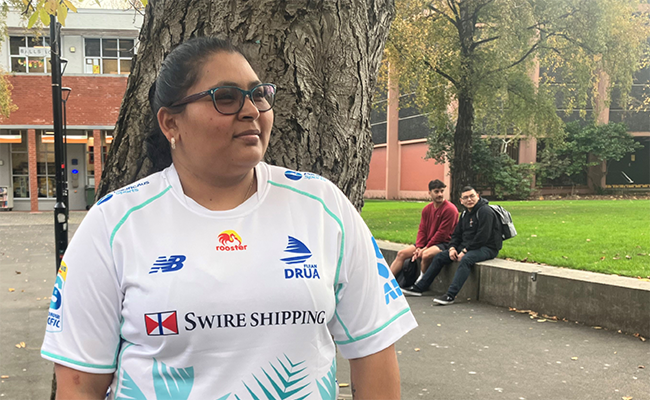
PhD candidate Sandhiya Gounder says cultural and traditional approaches to achieving national unity in Fiji would be more effective than government policies.
Welcome to the fourth instalment in our new series 'Introducing postgraduate SGSC', which focuses on postgraduate students within the Sociology, Gender Studies and Criminology Department. In this edition we chat with Sandhiya Gounder about her research on the Fijian government's attempt at achieving national unity. There are links at the end of this story to the first instalments of the series.
Cultural and traditional approaches to achieving national unity in Fiji would be a far more effective than some of the current policies the government has put in place, PhD candidate Sandhiya Gounder says.
The sociology student, from Fiji and studying at Otago, says the country has “deep seated disunity” which the former government campaigned on fixing prior to coming into power. The newly elected government replaces the previous government which held power for 16 years.
Believing people were more united than the government said, Gounder wanted to explore the reality to see if what political leaders were claiming reflected what was happening “on the ground”.
Fiji recently held an event acknowledging the contributions of indentured labourers, usually Indians who were shipped to Fiji by the colonial government.
Another event celebrated a person Ratu Sir Lala Sukuna, who played a major role in terms of land ownership in Fiji, and the cultural traditions of indigenous Fijians.
“The two events basically allow people to know about the journey of these two ethnic groups, and why they think that way, why they behave that way.”
The events encourage people to consider the journeys indigenous Fijians and Fijians of Indian descent have taken, which helps to improve attitudes and social relationships between the two groups.
“Those things can only happen if we know the culture of other ethnic groups, when we know the language of other groups.
“For people to really accept each other, they need to know the journey people have been on, the journey of each ethnic group, and how they have contributed to Fiji.”
All Fijians have contributed to the country's economy and deserve to be called Fijians, she says.
The former government has tried to impose laws and policies to bring about unity, however Gounder says using cultural and traditional methods would prove more effective.
“If it's the law of the country, then people are forced to do it, but national unity should be intrinsic, it should come from within.”
Fiji is a multi-ethnic nation which the former government says is divided politically, socially and culturally, and it implemented a series of reforms including constitutional, institutional and electoral reforms try to unite the people.
Some reforms had proved effective while others were just a façade to help the current power remain in power, she says.
“For people to really accept each other, they need to know the journey of each ethnic group and how they have contributed to Fiji.”
The Western Division of Fiji, where Gounder comes from, is “very agrarian” and has a lot more social cohesion.
“You don't see a lot of everyday discrimination or, you know, stereotypes and hatred, ethnic hatred, and all that, in the Western Division,” she says.
People might find these things in the Central Division, however, as it is more politically centred, she adds.
One of Gounder's findings is the political leaders who use national unity as a discourse in political discussions seem to be more disunited than ordinary Fijians.
“At the ground level, my research findings show that there are some reforms that were brought in for the national unity agenda. They have been really effective in achieving national unity, while there were others brought in for the national unity agenda – they are there for façade of national unity.”
They are reforms implemented basically for those political leaders to remain in power and includes reforms such as the electoral reforms, she says.
“It doesn't show the genuineness of what they say and what they really do, there is a difference in theory and practice.”
Gounder will submit her thesis in August. She will return to Fiji in September, but she would love to come back to Aotearoa in future.
-Kōrero by internal communications adviser, Koren Allpress
